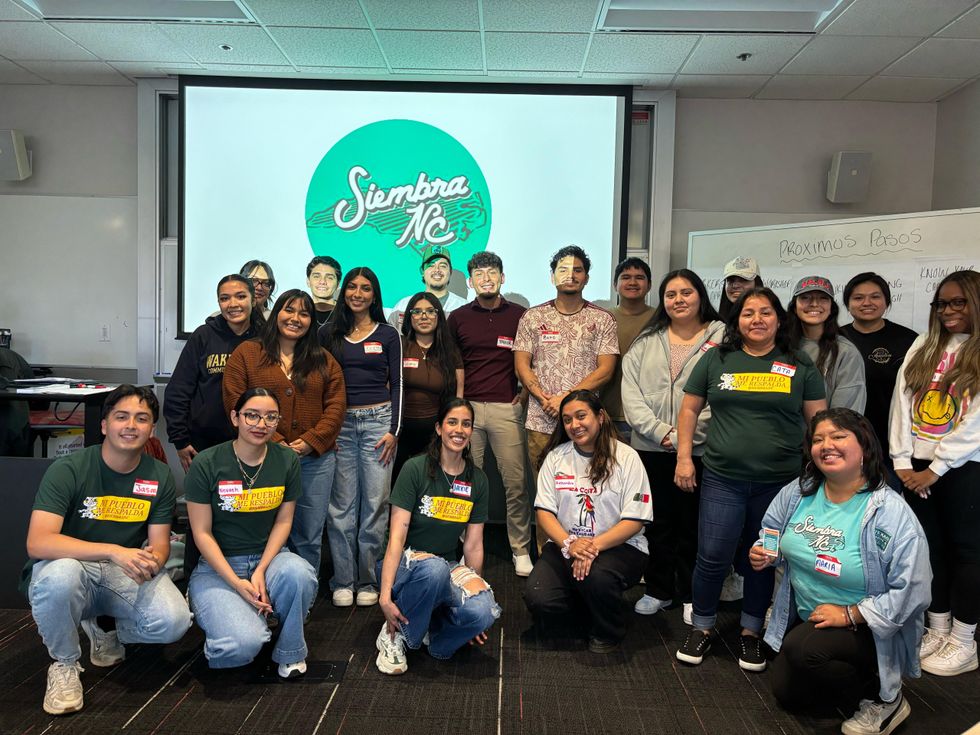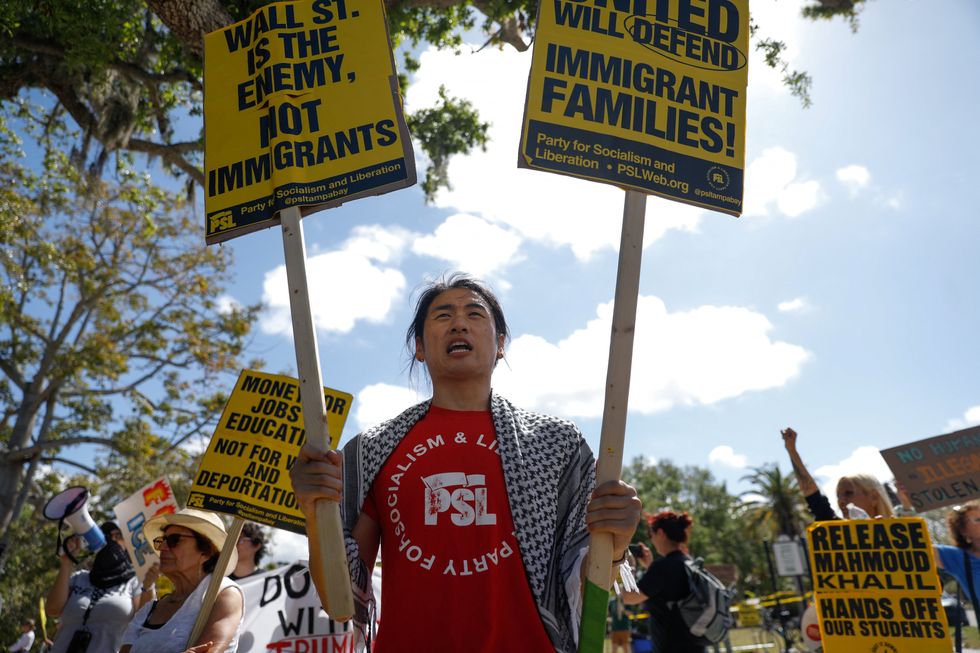'Culture of fear': College records reveal campus ICE panic
A quick Walgreens trip near campus turned into an interrogation about foreign travel. Uniformed officers demanded citizenship papers from students. The FBI searched for a professor in the Center of African Studies. Department heads advised biology labs to lock their doors after U.S. Customs and Immigration Enforcement (ICE) agents were allegedly spotted nearby.
Such stories ricocheted around the University of Illinois Urbana-Champaign last spring, ratcheting up anxiety, internal emails obtained by Raw Story show.
Police chief Matt Ballinger wrote there was no evidence ICE had carried out any such operations but also explained the problem: ICE doesn’t notify local police when making inquiries.
The emails show how fear cascaded across Illinois’ flagship campus, where more than 12,000 international students — around 20 percent of the student body — suddenly felt at risk.
The panic unfolded amid high-profile national cases, as ICE detained student visa holders who had spoken out in support of Palestine. At Illinois, professors and administrators scrambled to respond: how should students handle being stopped by officers? Could they report crimes without drawing unwanted attention? Was it safe to attend graduation or even walk across campus?
As the Trump administration cracks down even on immigrants with green cards and visas, such panic amid the second-largest international student population at any U.S. public university is emblematic of the higher education landscape.
‘It’s going to be like this a long time’
“Another day, another rumor,” Martin McFarlane, director of International Student and Scholar Services, wrote on April 17 to Chief Ballinger and two associate chancellors.
“It’s going to be like this for a long time, isn’t it…”
Rumors persisted. But by mid-August, the university had “no confirmed reports” of ICE on campus, Patrick Wade, a UIUC spokesperson, told Raw Story.
Wade called incidents of panic “certainly concerning,” given “international diversity is one of the things that makes Illinois special.”
Megan Eagen-Jones, an assistant professor of musicology and director of undergraduate studies, said academic leaders sought guidance on “appropriate allyship and advocacy that's not breaking the law but is also standing by students who have these concerns.”
“We understand the anxiety and concern that students — and faculty and staff, for that matter — are feeling,” Wade said.
Wade said the university informed the campus community about “what to do if they encounter a federal agent” and “proactively communicated” that local and campus police “do not enforce immigration law, nor do they provide resources to federal law enforcement to do so.”
At other colleges, particularly in Florida, campus police departments have voluntary agreements with ICE that deputize campus officers for immigration enforcement duties.
“The past months have been unsettling and frightening for many members of our campus community, and we appreciate the work of all those involved in supporting our students and scholars,” Wade said.
‘Another universe’
Since Trump took office for a second term, the climate has changed at the University of Illinois, especially for international students “fearful of being deported all of a sudden, having their academic studies disrupted,” Eagen-Jones said.
“It tethers to every aspect of their life. The fears are pretty real and pretty raw.”
Eagen-Jones wrote to the Office of the Vice Chancellor for Diversity, Equity and Inclusion on April 17, asking how to advise international students who want to file a police report but “are concerned about how that may draw ICE attention to them.”
“It sort of feels like living in another universe,” Eagen-Jones said.
“Five years ago. I wouldn't have imagined that I would be having the kinds of conversations with students that I'm having today and last semester.”
Eagen-Jones said international students were “worried … because if they express any political views whatsoever that might be seen as minor critiques … that would be foundation for some disastrous thing happening to them.”
Detention by ICE is the primary concern — stoked by the fates of Rümeysa Öztürk, a Turkish Ph.D. student at Tufts University, and Mahmoud Khalil, a graduate student at Columbia, both detained in March over views expressed in public forums.
A Raw Story investigation revealed a university in Florida flagging for police all negative commentary about the school’s partnership with ICE, raising free speech concerns.
“I want my students … not to be worried about being deported because they had a minor traffic violation, or they said the wrong thing in the wrong context,” Eagen-Jones said.
Eagen-Jones has participated in training sessions to learn more about international students’ rights.
“I'm in a college that really, really deeply values global connections and global creativity and is very much indebted to global partnerships,” Eagen-Jones said. “Rhetoric that demonizes international students and migrants, it's hard to process."
‘Distressing’
In an April 15 email, Supriya Prasanth, professor and head of the Department of Cell and Developmental Biology, wrote to academic leaders to report the Walgreens incident involving a student of “Indian origin” who was left “quite shaken.” The similar incident at Target involved a student of “Chinese origin.”
Wojtek Chodzko-Zajko, vice provost for graduate education and dean of the Graduate College, responded, “It is disheartening to hear that one of our graduate students had an unsettling experience while simply trying to complete an everyday task.
“Even when an encounter appears polite, being unexpectedly approached and questioned can be distressing, particularly for international students who may already be under significant stress in the current moment.”
Alejandro Lleras, professor of psychology and associate dean for inclusive excellence, reminded James Imlay, professor and associate head of microbiology, that “in any interaction with a federal officer (ICE, FBI, DHS), it is of paramount importance that people do not lie.”
“Lying to a federal officer can be taken as a reason to cancel someone’s legal status in the US. But, I would say that students are not necessarily required to answer questions either,” Lleras wrote.
Lleras noted that spaces requiring an ID swipe for access, such as dorms and labs, are considered private and “safe.” ICE agents would be permitted in public spaces, including classrooms.
Lleras asked Imlay if he had any evidence ICE agents were in town, as reported by students, adding: “This is important because there is also a fear that some people might be impersonating agents, in which case there are legal repercussions for this.”
Ballinger, the chief of police, told leaders charges would likely be brought if an impersonator was located, but police found no indication of agents or impersonators.
“We continue to try and identify anyone that may be impersonating ICE, but it is like chasing our tails at this point with third-hand information that is incorrect,” Ballinger wrote on April 17 in an email chain involving “pressing questions about ICE agents.”
McFarlane, director of ISSS, noted that “rumors were flying,” and a black car parked with a “secure, contain, protect” decal “may have been misinterpreted as ICE.”
“Very frustrating but it’s going to continue as long as people are scared,” said Robin Kaler, associate chancellor in strategic communications and marketing.
Nearly a month later, Ballinger forwarded to campus police leaders an FBI contact who could answer questions about ICE operations.
“This is a serious safety issue,” Ballinger said.
Universal fears
As ICE agents continue to raid locations from Home Depots to farms and food markets, a nationwide Campus Defense Network has grown from a group in North Carolina.
Siembra NC provides “ICE Watch” training to at least 40 schools in 20 states, said Andrew Willis Garcés, a senior strategist.
Rumors of ICE sightings on the Illinois campus are similar to concerns at campuses across the country, Garcés said.
 Siembra NC gathers at North Carolina State University (Photo courtesy of Siembra NC)
Siembra NC gathers at North Carolina State University (Photo courtesy of Siembra NC)
Florida Atlantic Faculty union leader Chris Robe said such fear is cultivated as a means of control.
“I think the point is the fear … to make people wary, to shut them up,” Robe said.
“How are they going to do [campus raids]? Practically, they're not. But they’re going to create the illusion that they can, and for a lot of people, that illusion is enough to stay quiet.”
He added that the impact of that strategy is unmistakable: “There’s a culture of fear this time around, of people not willing to speak on the record or just be public.”
Siembra NC has supported students setting up watch alert networks while some students are showing up to support international students at court, Garcés said.
“The concerns are related to what they've seen in the news — a student goes to a regular ICE check-in and is detained without warning, or students on campus who have valid visa work permits, green cards, getting detained, just getting abducted in broad daylight.
“International students are very understandably worried about any contact with law enforcement, with federal agencies.
“It really has, I think, changed just so much about it with what it means to be someone studying in the U.S.”



 One of nearly 1,500 blacked out pages sent to Raw Story in response to a public records request about ICE at New College of Florida
One of nearly 1,500 blacked out pages sent to Raw Story in response to a public records request about ICE at New College of Florida  Activists protest against an immigration policy event featuring Ron DeSantis in Sarasota. REUTERS/Octavio Jones
Activists protest against an immigration policy event featuring Ron DeSantis in Sarasota. REUTERS/Octavio Jones